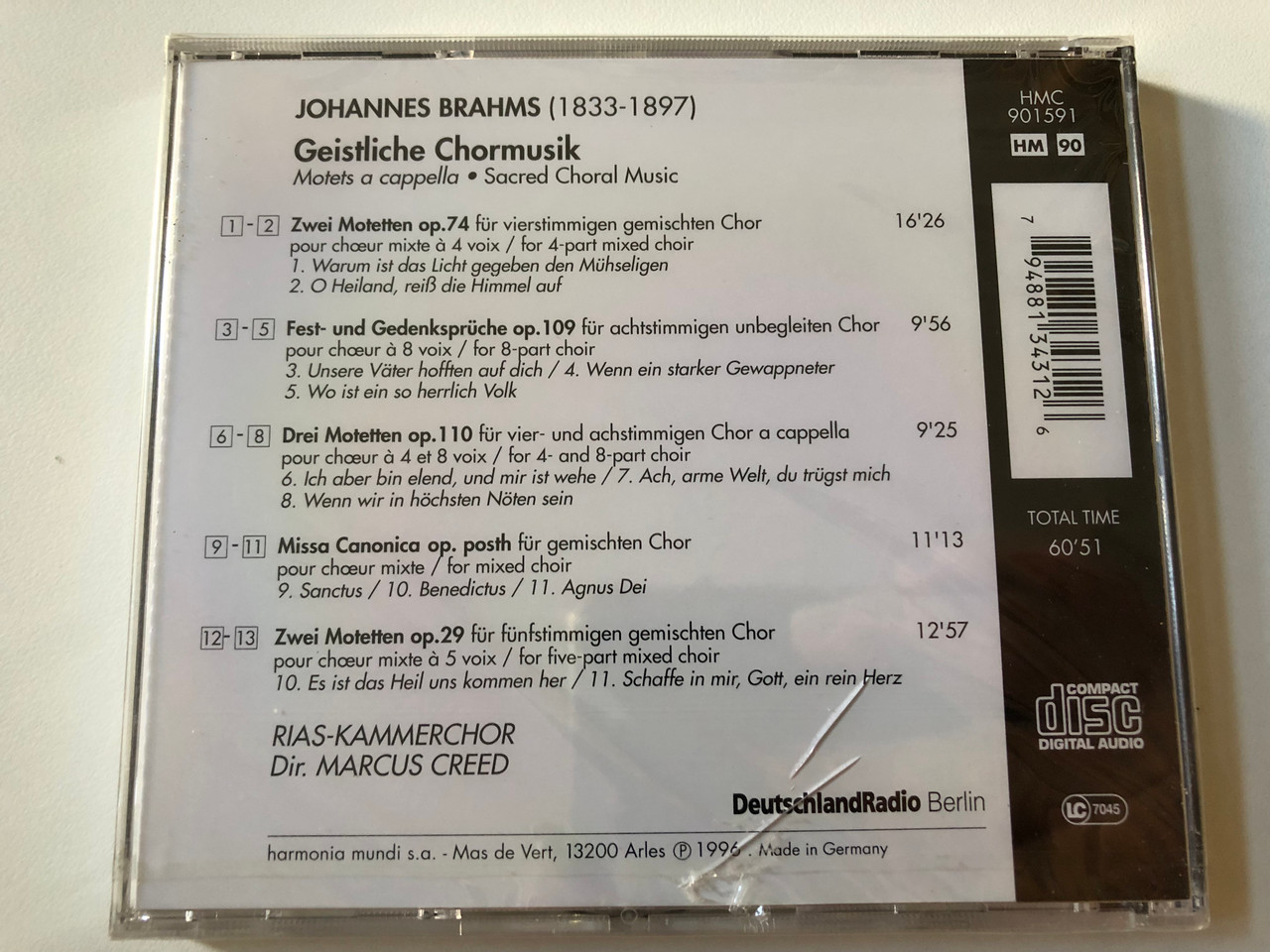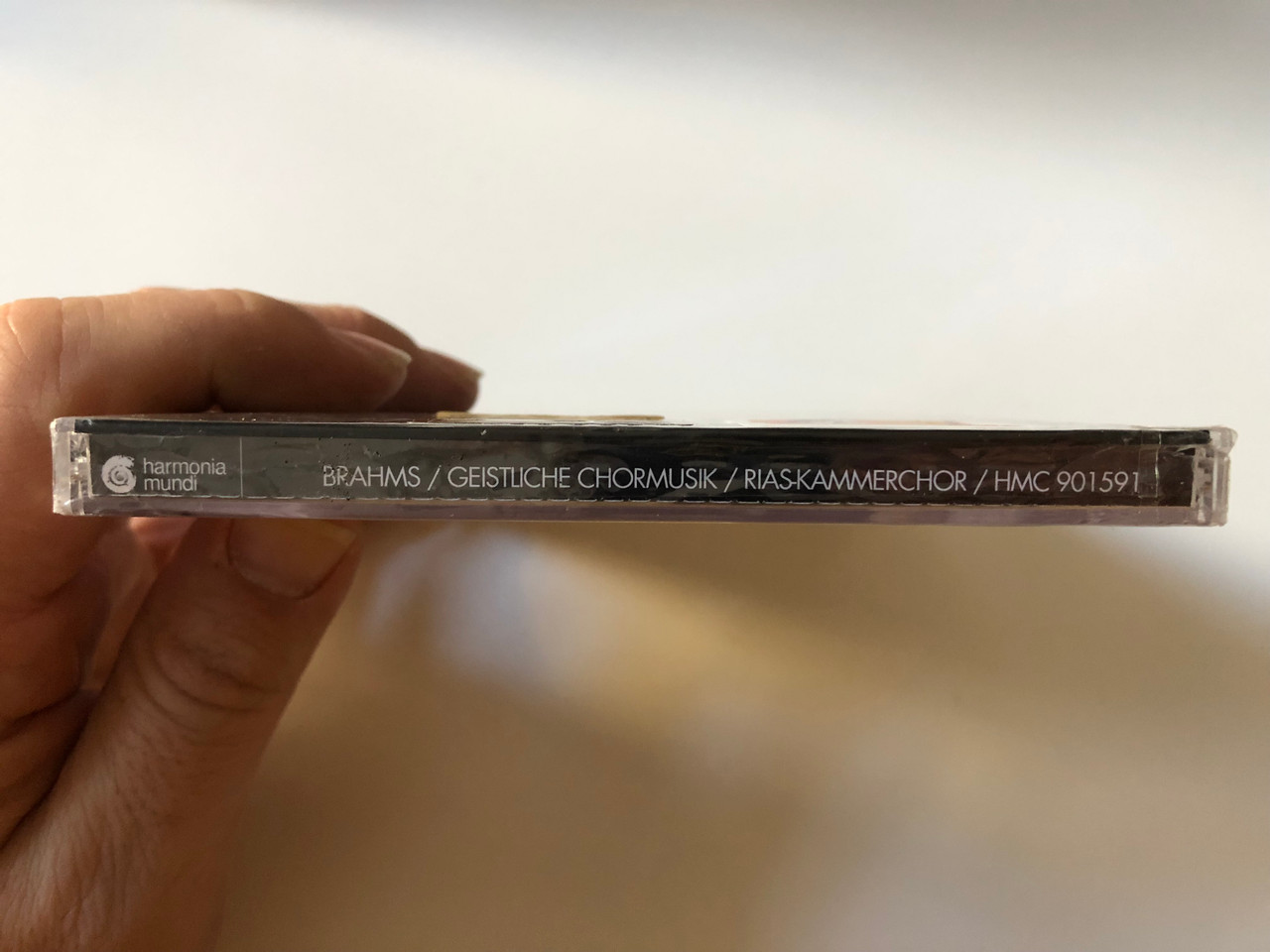Description
Brahms - Geistliche Chormusik = Sacred Choral Music = Musique Sacrée - RIAS-Kammerchor, dir. Marcus Creed / Harmonia Mundi France Audio CD 1996 / 901591
UPC 794881343126
Johannes Brahms (German: [joˈhanəs ˈbʁaːms]; 7 May 1833 – 3 April 1897) was a German composer, pianist, and conductor of the mid-Romantic period. Born in Hamburg into a Lutheran family, he spent much of his professional life in Vienna. He is sometimes grouped with Johann Sebastian Bach and Ludwig van Beethoven as one of the "Three Bs" of music, a comment originally made by the nineteenth-century conductor Hans von Bülow.
Brahms composed for symphony orchestra, chamber ensembles, piano, organ, violin, voice, and chorus. A virtuoso pianist, he premiered many of his own works. He worked with leading performers of his time, including the pianist Clara Schumann and the violinist Joseph Joachim (the three were close friends). Many of his works have become staples of the modern concert repertoire.
Brahms has been considered both a traditionalist and an innovator, by his contemporaries and by later writers. His music is rooted in the structures and compositional techniques of the Classical masters. Embedded within those structures are deeply romantic motifs. While some contemporaries found his music to be overly academic, his contribution and craftsmanship were admired by subsequent figures as diverse as Arnold Schoenberg and Edward Elgar. The detailed construction of Brahms's works was a starting point and an inspiration for a generation of composers.
| Label: | Harmonia Mundi France – 901591 |
|---|---|
| Format: |
CD
|
| Country: | Europe |
| Released: |
1996 |
| Genre: | Classical |
| Style: | Romantic |
Tracklist:
| Zwei Motetten Op.74 | (16:26) | ||
| 1 | Warum Ist Das Licht Gegeben Den Mühseligen | 11:05 | |
| 2 | O Heiland, Reiß Die Himmel Auf | 5:21 | |
|
Fest- Und Gedenksprüche Op.109 |
(9:56) |
||
| 3 | Unsere Väter Hofften Auf Dich. | 2:21 | |
| 4 | Wenn Ein Starker Gewappneter | 3:03 | |
| 5 | Wo Ist Ein So Herrlich Volk | 4:32 | |
|
Drei Motetten Op.110 |
(9:25) |
||
| 6 | Ich Aber Bin Elend, Und Mir Ist Wehe | 3:22 | |
| 7 | Ach, Arme Welt, Du Trügst Mich | 2:25 | |
| 8 | Wenn Wir In Höchsten Nöten Sein | 3:28 | |
|
Missa Canonica Op.Posth |
(11:13) |
||
| 9 | Sanctus | 3:24 | |
| 10 | Benedictus | 2:14 | |
| 11 | Agnus Dei | 5:24 | |
|
Zwei Motetten Op.29 |
(12:57) |
||
| 12 | Es Ist Das Heil Uns Kommen Her | 5:30 | |
| 13 | Schaffe In Mir, Gott, Ein Rein Herz | 7:27 |
- Alto Vocals – Andrea Effmert, Bärbel Kaiser, Dorte Küsters, Marie-Luise Wilke, Simone Alex, Ulrike Andersen, Ulrike Bartsch, Waltraud Heinrich
- Bass Vocals – Erich Brockhaus, Janusz Gregorowicz, Johannes Niebisch, Jörg Gottschick, Klaus Thiem, Markus Sandmann, Norbert Klesse, Paul Mayr, Rudolf Preckwinkel, Werner Matusch
- Choir – RIAS-Kammerchor
- Composed By – Johannes Brahms
- Conductor – Marcus Creed
- Engineer [Prise De Son] – Hans Martin (tracks: 3 to 8), Henri Thaon de Saint André* (tracks: 1, 2, 9 to 11)
- Executive-Producer – Achim Dobschall
- Layout – Relations, Arles
- Liner Notes – Derek Yeld
- Liner Notes [German Translation] – Walter Paluch
- Mastered By – Anne Klasen
- Photography By [Booklet - Creed] – C. Janetscheck
- Photography By [Booklet - RIAS-Kammerchor] – W. Bethsold
- Photography By [Illustration] – Jörg P. Anders
- Producer [Direction Artistique] – Helge Jörns (tracks: 1, 2, 9 to 11), Klaus Bischke (tracks: 3 to 8)
- Soprano Vocals – Annette Schneider (2), Dagmar Wietschorke, Gudrun Barth, Hannelore Starke, Inès Villanueva, Judith Schmidt, Kristin Foss, Madalena De Faria, Marianne Schumann, Roswith Kehr-von Monkiewitsch, Sabine Nürmberger-Gembaczka, Sabine Szameit, Stephanie Möller
- Tenor Vocals – Christian Mücke, Friedemann Körner, Horst-Heiner Blöß, Kai Roterberg, Markus Schuck, Reinhold Beiten, Wilhelm Füchsl, Wolfgang Ebling


























